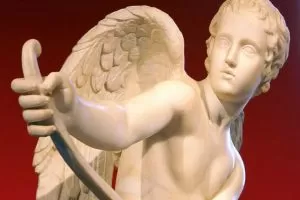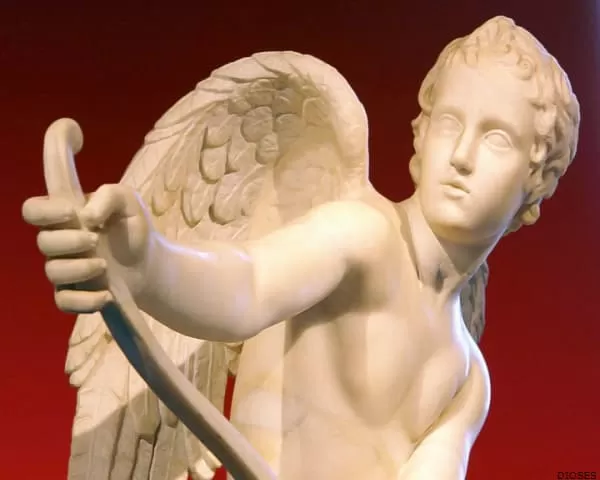Meaning of the God Eros
Eros was the mischievous god of love, a subordinate and constant companion of the goddess Aphrodite.
Who Was the God Eros ?
Eros, a little boy with wings and arrows, is seen fluttering in various love and romance scenes throughout ancient Greek mythology. Flying over the lovers, he seems very cute and adorable. But, he’s more of a nasty guy sometimes. One can never predict who will be shot by his arrow, as he chooses his victims at random. The wounds caused by his arrows arouse feelings of passion, obsession and reckless desire in people. Although he is not revered as one of the main deities of the Greek pantheon, he is definitely one of the most prominent figures in Greek mythology.
The ancient Greek pantheon has always tried to answer fundamental questions related to all aspects of life. Like the other polytheistic religions, the ancient Greek religion gives us specific deities that we must worship in order to achieve specific ends. Love is an innate feeling that exists in every individual, and has been considered by many philosophers as the very foundation of all existence.
The Greek god, Eros, who represents love, romance and sexual desire, is an attempt to link the human emotion of love with the divine, and thus, in some way, close the gap between human feelings and those of the gods. Eros encompasses a mysterious energy, which is the essence of all creation. Here, love has been given a spiritual connotation and has been seen as a feeling that can transform the human psyche, and Eros acts as a guiding force in the process.
In Greek mythology, Eros is not only “love” in person; but it is also a catalyst, which releases human desires and activates the creative process of the mind. In short, he is the turning point of each and every creative process that takes place in the universe. Therefore, whether he is a primordial god or an Olympian deity, the creation of new energy in the universe remains his primary function.
What Attributes Does the God Eros Have ?
- His arrows. Sometimes he is seen riding a dolphin or a lion.
- Eros has a very vivid and elaborate iconography, very similar to the other gods and goddesses of the ancient Greek tradition.
- However, what distinguishes him is the sudden metamorphosis of his personality from a primordial god to a mischievous little boy, and finally to a young adult. The Romans adopted the first “childlike” representations in Cupid, their God of love.
- A small winged child in representations. In the early images, the Greek god of love was often shown as a beautifully formed, adult man.
- Eros invariably has wings, regardless of whether he is a primordial deity or an Olympian God.
- When he is a primordial god, he is shown emerging from the egg of the world. He has wings and has a staff in his left hand and a torch in his right. His body is surrounded by a serpent, which means immortality and infinity of the universe.
- The earliest depictions of Eros portray his close association with Aphrodite. In fact, it became an important aspect of Aphrodite’s iconography in the Classic period.
- He is often depicted as a cute and mischievous child with wings either sitting, standing or playing at the feet of the goddess. Sometimes, he also appears in the arms of Aphrodite or in a flying pose near her shoulder. He holds a bow in one of his hands.
- In later times, when the idea behind his primordial avatar was deciphered as a connecting link between love ambition and reproduction, he came to be depicted alone, as a young man with a bow and arrow and sometimes a burning torch.
What is the Power of the God Eros ?
- Eros has feathered wings and the power of flight. As the god of passion, Eros has the task to make people fall in love and to make them fall in love.
- He shoots two kinds of arrows, made by his adoptive father Hephaestus: gold tipped arrows, which make someone fall madly in love with someone, and lead tipped arrows, which make someone run away from someone else.
- Eros used his powers maliciously and for his own amusement: he would make people who were total enemies fall in love or break up happy couples. However, Eros began to take his work seriously after he fell in love with Psyche himself.
- Eros (Love) has been considered a more powerful god than Ananke (Need). Love is not concerned with ugliness or violent dealings derived from the convincing power of Need.
- And ever since Love came into being, the delight of beautiful things surpassed the dominance of Need, bringing all sorts of benefits to both gods and mankind.
History of the God Eros
Some say that there are two Eros, the old man who is the primitive god and the other who is the eternally young son of Aphrodite. The “old” Eros was the cause of the birth of the race of immortal gods and goddesses. The “younger” Eros is the one described as a winged child, the son of Aphrodite, considered the most beautiful and the youngest of the gods.
But even in this form, children grow up. Problems arise when Eros (called Cupid in this story) falls in love with Psyche. Her glow is such that, for her own safety, he insists that she should never look at his face, and only visit him at night. At first, she is fine with this, but her sisters and family insist that her husband must be a grotesque and dangerous monster. Finally, to silence them, one night she lights a lamp and sees his glorious beauty, which does not explode, but makes her tremble so hard that she shakes the lamp.
A few drops of hot oil drip onto her beloved, burning her, and he walks away from her in physical pain, aggravated by the pain of knowing that she doubted him. His mother, Aphrodite, is angry about the injury and the hidden relationship. While Eros recovers, Aphrodite hopes to get Psyche out of the way permanently, making life extraordinarily difficult for her daughter-in-law.
This takes the form of several potentially deadly tasks, such as going through a beauty lotion from Persephone in the Underworld, and, oh, while you’re away, Psyche, you could pick up some bottled water from the River of the Dead. But Eros finally recovers, comes to her rescue, and they get married. As is fitting, the God of love is made happy forever.
Myths About the God Eros
Because Eros represents love, one of the fundamental aspects of life, many theories consider it to be one of the Protogenies, the first-born divinities, from whom the whole universe emerged. According to the narrative of Hesiod, a seventh century BC Greek poet
Eros was the fourth primordial being to exist, after Chaos (cosmic void), Gaia (Earth) and Tartarus (the underworld). This means that Eros was unrelated, according to Hesiod, and was born alone.Hesiod’s theory was partially supported by a fourth century B.C. philosopher named Parmenides, in the sense that he agreed with the primordial origin of Eros, but considered that he is first and foremost the Protogeny.
In the Orphic myth, on the other hand, Eros is one of the original deities, but not entirely primordial in nature. This means that Orphism does not consider Eros to be born alone. On the contrary, he considers him to be a son of Nyx, the Greek goddess of the night. According to the description of Aristophanes, a fourth century BC Greek playwright, the primordial divinities were Chaos, Nyx, Erebus (darkness) and Tartarus. Nyx, the black-winged goddess, laid an egg in the depths of darkness, and sat on it for a long time together.
Then the egg hatched, and Eros (love) came out of it. Its form was pure and beautiful, and it had golden wings that glowed in the dark. In the Tartarus pit, Eros copulated with Chaos, giving birth to all animate beings, and bringing order and harmony to the universe. It is the attraction created by Eros, which leads to their marital union, and gives birth to new life and energy. Eros thus becomes the source of all creation, as it makes people fall in love and awakens in them sexual desires.
Regarding the birth of Eros, there are a number of theories that have been put forward. Eros has been mentioned as the son of Aphrodite and Hermes, Aphrodite and Ouranos, and Zeus and Aphrodite. Eros, therefore, does not have a fixed family that has been accepted by all. But, the common factor that appears in most lineages is their association with Aphrodite in one way or another. That also explains her association with love, a human emotion that characterizes God. Opinions differ as to their affiliation, and each seems to have been founded on a solid platform. However, their association with love never ceases to exist.
Aphrodite With Erots
The most accepted lineage of Eros comes from Aphrodite (Goddess of beauty, lustful love and pleasure) and Ares (God of war and bloodshed). It has also been mentioned that Eros had three more brothers from the same parents. Collectively known as the Eros, they include, apart from Eros, Anteros (God of required love), Pothos (God of desire), and Himeros (God of uncontrollable desire).
Another myth tells of the birth of Eros from the union of Gaia and Ouranos. Sappho, the sixth century B.C. poetess of ancient Greece, wrote that Eros was the first of Gaia and Ouranos’ children, who awakened sexual desire in living beings, and this accelerated the process of reproduction and procreation in the universe. Similarly, in another myth, he is the son of Zephyros (west wind) and Iris (rainbow). Alcaeus, an ancient Greek poet, postulates this probable family of Eros in one of his poems. He says that Iris, who wore “pretty sandals”, slept with “golden-haired” Zephyros, and this union led to the birth of Eros.
Eileithyia was a Greek goddess, taken from the Minoan tradition as a deity presiding over childbirth and midwifery. Olen of Lykia, the legendary early Greek poet, in one of his ancient Greek hymns to Eileithyia, says that Eros was born to her.
Eros and Psyche
The tale of Eros and Psyche seems like a fairy tale at first. However, only by delving into the personalities of Eros and Psyche can one notice the inner symbolism that the myth carries. It is not a story of two people in love; rather it is a tale that symbolizes the interconnection between love and the human soul, Psyche being the Greek word for soul. Psyche, in Greek, also means a butterfly and is therefore often depicted with butterfly wings.
Psyche is a mortal princess, so beautiful that people consider her divine and begin to worship her. This makes Aphrodite extremely jealous of Psyche, and she orders her son Eros to hurt her with his arrow and make her fall in love with an ugly looking guy. Although Eros does not like the idea of his mother very much, he accepts her request quite reluctantly. So, he flies to her palace during the night, and plans to hit her with his arrow while she is asleep.
When he reaches her bed and sees her face, he is overwhelmed by her beauty and instantly falls in love with her. The moment he pulls the string of his bow to shoot an arrow, Psyche wakes up and scares him. Leaving his task incomplete, he is forced to return to the kingdom of the gods. Meanwhile, Psyche’s parents are worried about her future. Her unparalleled beauty seems to be the main obstacle to finding suitors for her, because no one dares to propose to her. The oracle of Apollo asks them to prepare her for marriage and then to abandon her.
They do as he is told, and carry her in a royal procession to the top of a cliff, and then abandon her. While she is alone on the cliff, a miracle occurs, and she arrives at a lush green forest, in the center of which is a beautiful palace. This palace becomes her new home, where she is accompanied by invisible spirits, who are always at her service. Here, she even has a lover who visits her every night and who is not allowed to look. So, although she is deeply in love with this mysterious man.
In the midst of all this, Psyche can hear the voices of her sisters, who seem to miss her very much. Because of this, she returns home to meet her sisters, who are very jealous to hear about their invisible lover. Her comments, such as “He may be a monster,” make her too suspicious of the “mystery man,” and she decides to see his face and returns to the palace. In the middle of the night, while her lover is sleeping, she lights an oil lamp and sees the beautiful place of Eros.
However, the sudden light in the darkness of the night wakes Eros, who pushes the lamp aside, only to be hurt by spilling some hot oil from the lamp. After this incident, he feels betrayed, leaves Psyche and returns to the kingdom of the Gods. After this, Psyche becomes very depressed and returns to her parents in a miserable condition. She goes to every possible temple and makes numerous sacrifices to various gods and goddesses to get her lover back, but nothing seems to work.
Then, one day, her prayers seem to be answered by none other than the goddess Aphrodite. Knowing that she is the mother of Eros, Psyche begs him to help her get her heart back. Aphrodite agrees on the condition that Psyche successfully completes a series of arduous tasks, including a journey to the underworld. Psyche accepts and succeeds in the tasks, though with divine help. In fact, Eros himself guides her during her last task.
Psyche’s successful completion of all the tasks and her determination to get Eros back, impresses Aphrodite who, with Zeus’ intervention, organizes her official wedding. Zeus, then, grants Psyche immortality while she marries Eros, and lives with him in the kingdom of the gods, happily ever after.
Eros and the Virgin Goddesses
Although Eros was the god of love and sexual desire and could make anyone fall in love, he notably could not use his tricks on the three virgin goddesses: Artemis, Athena and Hestia. In fact, his arrows had no effect on these three goddesses. There are several references that speak of the endurance these goddesses possessed regarding love. Homer, in one of his hymns dedicated to Aphrodite, writes that the goddesses Artemis, Athena and Hestia are immune to love and sexual desires.
In another case, Sappho, the poetess, writes that although the arrows of Eros have the capacity to make one fall miserably in love, Artemis is not affected by them. Furthermore, she says that Eros can never approach Artemis to point his arrows at her. Apollonius of Rhodes, a third century B.C. Author, writes about Athena’s immunity to Eros’ arrows Athena says that the child (Eros) can never enchant her with his arrows, because they never seem to cause her any kind of injury. Apollonius says that since Athena was born from the head of Zeus, she is sexless and therefore love never affects her.
There is a very interesting example where there is a battle between Eros (love) and chastity. Chastity emerges victorious in the end, and Eros is captured in chains and bound at her feet. This sheds light on the importance that the ancient Greek gave to the chastity or purity of a woman. Therefore, it was probably also the concept of the virgin goddesses.
The Matchmaker
For Eros, matchmaking was a sport, and his favorite pastime, too. He shot his arrows at anyone and anytime, and once wounded, the victim was forced to fall in love. No one could escape his charms (except the virgin goddesses), but sometimes, he could be really unpleasant. Eros has two types of arrows, namely, gold and lead-tipped. The gold tip ones made one fall in love with the first person he saw. The lead-tipped ones, on the other hand, instilled hatred.
Seneca, a philosopher and playwright of the 1st century A.D., writes about the “unquenchable fire” that is caused by the arrows of Eros. He says that all his gods, including Zeus, Ares, Hephaestus and Apollo, are his victims. Furthermore, Seneca claims that the arrows of Eros make the gods so greedy for the earthly maidens that they are forced to leave Mount Olympus and reside in the mortal world in other forms.
Ovid, the first century B.C. The poet beautifully narrates an incident in which Eros is insulted by Apollo and therefore decides to take revenge. Here Apollo with his golden-tipped arrow and makes him fall for Daphne, a water nymph. On the other hand, he hurts Daphne with his leaden-tipped arrow and makes her hate all men, especially Apollo. She becomes extremely irritated with Apollo as he continually pursues her, begging for her love and attention.
Finally, after days of continuous running, when there is no more strength left in her body, Daphne prays to her father Peneus (the God of the rivers) and asks him to destroy her beauty or her life. Peneus then transforms her into a laurel tree. Apollo blesses the tree with eternal youth and immortality. This episode has been interpreted by some scholars as a battle between lust and chastity, where (male) lust and (female) chastity are shown to be fighting each other.
Ovid tells another example where Aphrodite, while caressing Eros, is wounded by his golden-tipped arrow. Although she pushes him aside instantly, the wound is deep enough. She immediately falls in love with the first man she meets, Adonis, the God of feminine beauty and desire. Ovid also details a scene in which Arosodite orders Eros to shoot an arrow into the heart of Hades, the God of the Underworld. Eros obeys his mother’s orders and makes Hades fall in love with Persephone, the daughter of Demeter (the goddess of harvest).
Later, Hades kidnaps Persephone, takes her to the Underworld and marries her. Nonnus, a Greek poet from the 4th century AD, tells a story of Dionysus (the god of wine, joy and ecstasy), who is shot by Eros’ arrow and falls in love with Aura (the personification of the breeze). Eros also advises him to marry Aura, while she is asleep. There are several myths that tell us about the effects of Eros’ arrows on mortal heroes. The classic example is the episode in which Paris, the Prince of Troy, kidnaps Helen, the Queen of Sparta. The Greek poet, Theognis of Megara, narrates this episode and says that it was ‘cruel Eros’ who was responsible for the Trojan War.
Sons of the God Eros
Hedone
It was the embodied spirit of pleasure and enjoyment. As the daughter of Eros (Love), she was more specifically the goddess of sensual pleasure. She is the daughter of Eros and Psyche.
Temples of the God Eros
- The cult of Eros was also prevalent in pre-classical Greece, but at that time, it was a minor deity. However, in the Classic period, God stood out and started being worshipped on a much larger scale.
- In the Greek city of Thespiae, there was a fertility cult that worshipped Eros. According to Pausanias, a Greek geographer of the 2nd century AD, the Thebes worshipped him in the form of unshaped stone. Later, a sculptor named Lysippos made a bronze idol for them.
- Eros was equally revered by the people of Parion on the Hellespontus, where his worship was greater than that of any other deity.
- In Athens, there was an altar dedicated to Eros, with an inscription that bore the name of the dedicator. Here, the fourth day of each month was considered sacred to God.
- In Megara, Eros seemed to be a minor deity, and his statues, along with the other Eroses, were installed in temples dedicated to Aphrodite.
- In Leuktra in southern Greece, it is said that there was a temple and a grove dedicated to Eros.
- Erotidia was the festival held after every five years in Thespiae in honor of Eros. Sources tell us that various gymnastics and music competitions were held during the festival, and married couples worshipped God during this period, to settle their disputes.
- This shows how prominent the worship of Eros may have been in Thespiae.
Related Topics
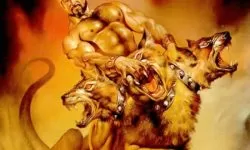
Who is Hercules in Mythology ? Son of Zeus and Alcmene
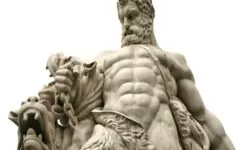
HERACLES GOD: Meaning, Powers and Attributes

ARTEMIS GODDESS: Characteristics, Powers and History
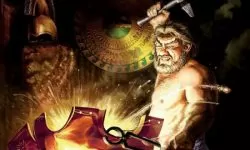
HEPHAESTUS MYTH: God of Fire, Son of Hera
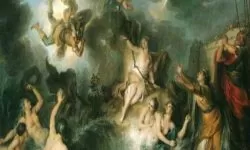
NAMES OF GREEK GODS: Apollo, Ares, Cronos, Dionysus

WHO IS THE GOD HERMES ?
Other Gods of Mythology in ALPHAPEDIA

THE GODDESSES OF MYTHOLOGY: Their Names and Meanings
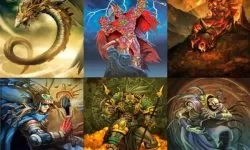
AZTEC GODS: List of Names, Meanings and Powers
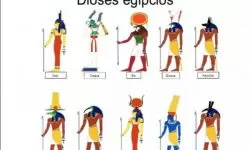
EGYPTIAN GODS: Their Names and Meanings
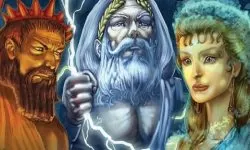
GREEK GODS: Names, Family Tree and Their Powers
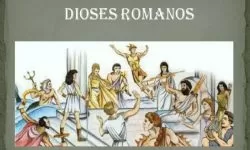
ROMAN GODS: Names, Meanings and Characteristics

NORSE GODS: Names, Meaning, Powers and History
Other Topics of Interest in ALPHAPEDIA

FREE CERTIFICATE PROGRAM IN MARKETING

FREE BACHELOR IN VISUAL ARTS

FREE BACHELOR DEGREE IN ARTS

FREE DOCTORATE IN SOCIAL WORK

FREE MASTER DEGREE IN PUBLIC RELATIONS

FREE DOCTORATE IN GEOLOGY
Images, Photos or Drawings of the God Eros
